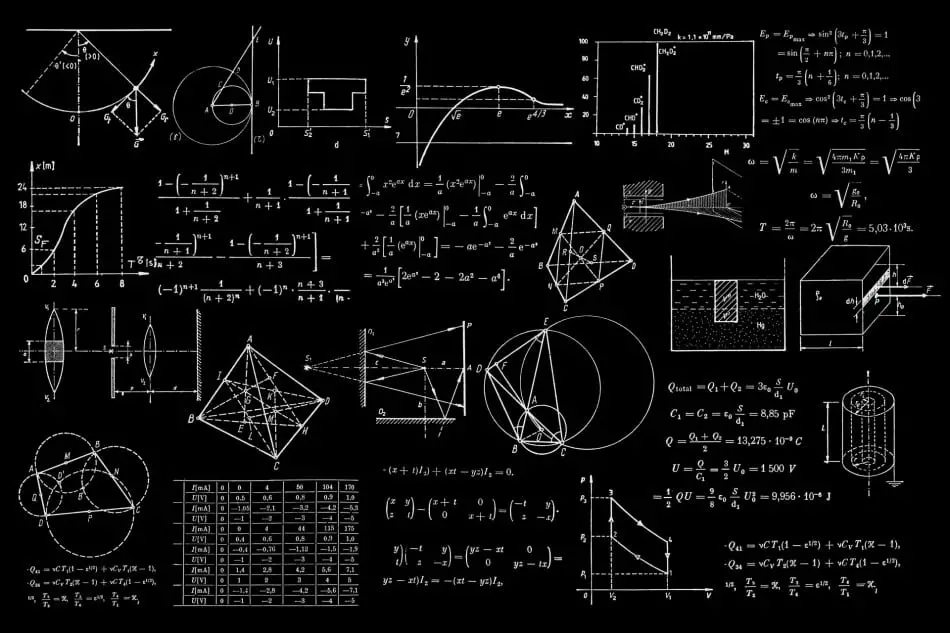Discrete mathematics, one of the three branches of modern mathematics, deals with a finite set of numbers that incorporates probability, algorithms, and logical analysis.
However, does this mean discrete math is hard to learn?
Although discrete math comprises complex techniques, its difficulty level is strictly subjective and dependent on the learner. You will find that just as some people find calculus difficult, discrete math is the same. Its complexity is entirely based on the learner’s ability to grasp mathematical concepts.
Discrete math is widely used in mathematics, science, and engineering applications.
This article will examine why it may or may not be difficult to learn, some of its disciplines, and strategies for making learning it easier.
5 Reasons Why Some People Might Find Discrete Math Hard to Learn?
While we are encouraging you to have a go at learning discrete math, we’ve found that exploring why one might find it difficult to learn is better.
-> Read Also What Is An Autodidact?
1. It is Different from Other Familiar Mathematical Concepts
At first glance, discrete mathematics might seem straightforward. However, as more is understood and put to use, the intricacies of this field start to reveal themselves.
Unlike continuous and simple algebra, discrete math focuses on proportional problem-solving logic rather than learning and applying formulas or theorems.
This may be difficult for people unfamiliar with complex terms such as combinatorial theory, modular arithmetic, or its other complicated aspects.
For example, it is easier to apply a mathematical formula to a problem and get the desired answer than to understand the logic behind the formula.
This is where the difficulty of discrete mathematics lies; it involves complex theoretical points that can be difficult for first-year math majors to grasp.

2. Cramming and Memorizing Will not Work with Discrete Math
To buttress the first point further, you would find that if you are used to only cramming and memorizing, you may find discrete math difficult.
You need to understand the principles behind every concept in discrete math. It involves Logical Reasoning, little formula, and more logical analysis.
Unfortunately, many students struggle with understanding proof steps and logic when solving discrete math problems.
3. The use of Computational Algorithms Increases its complexity
Students might find it very challenging to comprehend the mathematical procedures that make up discrete math because it requires them to understand computational algorithms.
4. The Long Duration of Study Involved
Discrete math requires several hours of study to grasp its concepts fully. A typical discrete mathematics course requires 10-15 intense weekly study hours. Many students may find this time-consuming.
5. The Teaching Method Adopted
Like many courses worldwide, the methods used to teach the students can determine how easily they will grasp what is being taught.
Therefore, discrete math should be taught theoretically as a point-by-point explanation of the methods to solve practical problems.

How to Simplify Learning Discrete Math
Discrete math becomes exciting once you understand the principles involved. However, there is no simplified approach to learning discrete math; you must take an active interest in it and dedicate enough time to learning it.
Nonetheless, if you stick to these guidelines, discrete math will become much easier for you:
- Break each concept into bits; don’t waste time attempting to grasp all concepts at once; instead, take it one step at a time.
- Start with the logic behind every formula or principle. Take definitions of terms seriously and see how you can incorporate concepts into your understanding.
- Understand all discrete mathematics proofs that clarify each concept. Recognize the reasoning behind each formula and then establish a connection to practical solutions.
- Devote yourself to the study of discrete mathematics, create daily tests, and give yourself strict time targets.
- Don’t rely so much on school lessons. Instead, go the extra mile and study online Discrete Math courses like Udemy, online textbooks, and YouTube videos.
Some good online resources include;
- Discrete Math | Learn Discrete Mathematics by easy methods | Udemy
- Discrete Mathematics with Applications: Epp, Susanna S.: 9781337694193
- Discrete Math | Codecademy
- Basics of Discrete Mathematics | Full Course on Discrete Mathematics | Great Learning
-> Learn more about the 7 best websites for self-learning
4 Reasons Why you Should Learn Discrete Math
Every mathematical concept, including discrete math, has a step-by-step approach. With some calculus experience, you should be able to understand discrete problems on a basic level.
Here we’ve put together five reasons why we think you should consider learning discrete math.

1. Discrete Math Apples to Every Field in Mathematics
Discrete math has useful mathematical concepts that you can apply in any area of engineering and mathematics.
It is one of the most diverse branches of mathematics as it covers almost all areas of mathematics and has a wide range of disciplines and topics.
Though there is no definite form of discrete mathematics, the table below covers the major disciplines and their related topics in the field.
| Types of Discrete Math | Related Topics |
| Set, Relations, and Functions | Integers, real numbers, natural numbers, Venn diagrams, set notations, relations, and functions. |
| Mathematical Logic | Propositional logic, Predicate logic, logic gates, and rules of inferences. |
| Group Theory | Operators & Postulates, modular arithmetic, combinatorial and game theories |
| Counting and Probability | Probability Distribution, charts, counting theory, variance, measures of dispersion. |
| Mathematical Recurrence | Mathematical Induction, Sequence and Series, Recurrence Relation, Permutations, and Combinations |
| Discrete Structures | Graph Models, Spanning Trees, and pictorial distributions |
| Boolean Algebra | Boolean Expressions, Simplification of Boolean Functions |
| Computational Algorithms | Logical algorithms, pseudocodes, discrete computations, logical predictions |
Table Adapted from Tutorialspoint
2. Discrete Math Concepts are Backed by Mathematical Proof
Discrete Math is a type of factual analysis. Unlike other mathematical concepts, which rely on practical solutions, every equation and method of solving discrete problems is completely supported by mathematical proof.
3. Discrete Math Does Not Rely Solely on Numbers or Formulas
Discrete mathematics is not your typical dull subject. On the contrary, it is an interesting and enjoyable way to rationalize math.
Rather than formulas or numbers, it employs logical analysis, expressions, game theories, probability functions, and other concepts supported by evidence.
4. It Deals with Real-Life Problems
This is what makes discrete math relatable. Discrete math interprets and solves real-world problems to make valid predictions.
It is not without its complex analysis, but it is an interesting way to translate math into real-world solutions. Some of this real-life situations include both are not limited to;
- Identifying spam emails and texts
- Identifying the different ways to sort a list item and
- Choosing the most effective way to choose a
-> Learn More about Self-Learning vs. Classroom Learning: Which Is Better?
Frequently Asked Questions

Q: Is Discrete Math the Hardest Type of Math?
Although discrete math is relatively difficult, it is not the most difficult type of math for STEM courses. For example, many students find Calculus II and algebraic differential equations more difficult than discrete math.
Q: Is Calculus A Prerequisite for Learning Discrete Math?
Most colleges require high school calculus as a prerequisite for studying discrete mathematics. Basic calculus will help you understand discrete math concepts, but it is not a primary determinant.
Q. Which Is More Difficult, Continuous or Discrete Math?
Higher-level Calculus is continuous math and is more difficult than discrete math. On the other hand, the underlying concepts of discrete math are much more difficult to grasp than those of continuous math.
Q: How Long Does It Take to Understand Discrete Math Fully?
Typically, it takes 12-16 weeks of active study to understand the primary concepts of discrete math fully. Moreover, it depends on the learning style and pattern of the learner; different people take different amounts of time to grasp the math.
Final Thoughts
Discrete math is a core requirement for all STEM majors. Though somewhat difficult to comprehend, this course is extremely important and beneficial, so the effort is well worth it.
By adhering to all the above guidelines and making personal efforts to grasp its concepts, you should be able to complete the course easily.
References
- https://assignmentgeek.com/blog/is-discrete-math-hard/
- https://www.tutorialspoint.com/discrete_mathematics/index.htm
- https://educationexponent.com/is-discrete-mathard/#:~:text=Discrete%20math%20is%20considered%20difficult,logic%20and%20abstract%20math%20problems.
- https://www.quora.com/What-is-a-good-way-to-learn-discrete-mathematics
- https://sciencing.com/how-to-learn-discrete-math-12752690.html
- https://educationexponent.com/is-discrete-math-hard/#:~:text=Discrete%20math%20is%20considered%20difficult,logic%20and%20abstract%20math%20problems.
- https://collegeinsider.org/is-discrete-math-hard/
- https://www.analyticssteps.com/blogs/7-major-branches-discrete-mathematics






